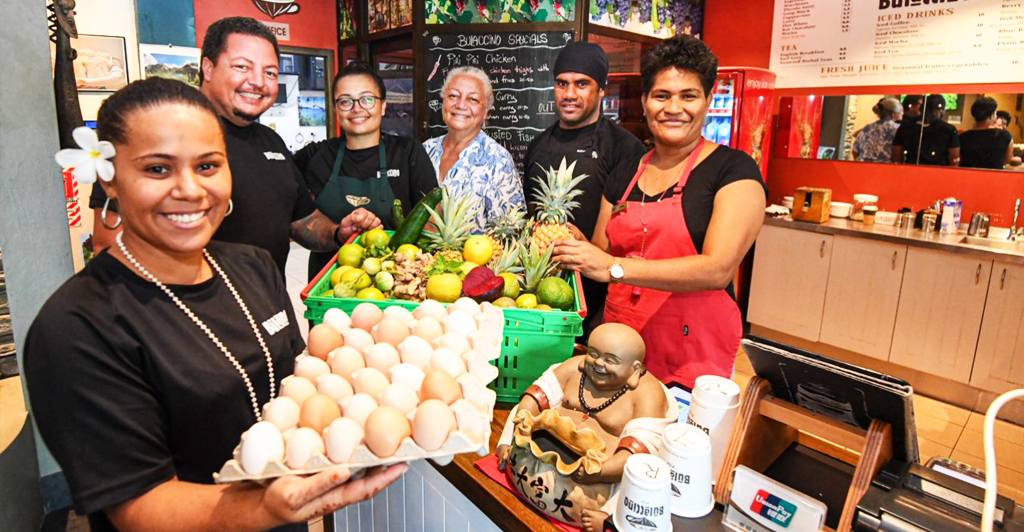
In 2016, Fiji celebrated its first ever Olympic gold medal at the Rio Games in Brazil from sevens rugby, a sport that placed the small island nation on the same pedestal as other developed nations.
Four years later, the nation like many countries in the world experienced unprecedented economic shocks because of the COVID-19 pandemic. In Fiji’s case the impacts were exacerbated by tropical cyclones Harold and Yasa.
The pandemic reversed years of development progress. An estimated 115,000 Fijians lost their jobs or are on reduced hours, which represents 13 percent of the population, or almost a third of the labor force. The majority of those people affected concentrated in the tourism sector.
Young people in Fiji were hit hardest by the country’s COVID-19-induced employment crisis. Even before COVID-19 impacts, youth unemployment had been persistently high, at 18 percent compared to the national jobless rate of five percent in 2015. The economic impacts of COVID-19 have heightened concerns about long-term labor market scarring from prolonged youth unemployment.
So, what are the prospects of Fiji in the next four years?
Any coach would know that for any match, good preparation and a game plan are necessary.
The World Bank Group (WBG) has released a four year “game plan” – the 2021-2024 Country Partnership Framework (CPF)- for Fiji’s economic recovery, drawn up after widespread consultation involving the Fijian government, civil society and the private sector. It’s a strategy closely aligned with Fiji’s National Development Plan and will be implemented by WBG member organizations- World Bank, International Finance Corporation (IFC) and the Multilateral Investment Guarantee Agency (MIGA).
The goals in the WBG strategy are to address the opportunities and challenges in the Pacific island nation and generally improve the livelihoods of Fijians, building resilience for a future sustained recovery.
The World Bank will be programming more than US $210 million to support implementation of the strategy – most of it on highly concessional terms under the Small Islands Economies Exception.
Supported by the Australian and New Zealand governments through the “Fiji Partnership”, IFC will mobilize in excess of US $300 million in private capital to help finance major projects in Fiji over the next four years, including in the areas of healthcare, renewable energy and affordable housing.
While Fiji has contained the virus, its border remains closed to international visitors- bringing the once thriving billion-dollar tourism industry and lifeline of the country to a standstill.
Returning the industry to its pre-COVID state depends on the length of the pandemic itself but planning now paves the way for a future sustainable industry.
“Fiji has been a top holiday destination for families from Australia and New Zealand and high-end visitors who have been attracted by the country’s exclusive island resorts, which creates jobs.” IFC representative in Fiji, Kiribati, Samoa, Tonga and Tuvalu, Deva De Silva said. “Countries closing their borders to protect their citizens is necessary but when they do open their borders, people will want to travel, and they will want to travel to countries like Fiji.”
In the CPF, IFC will focus on revitalizing sustainable tourism, while also reducing Fiji’s reliance on that sector through economic diversification, aided by accelerating the development of sustainable infrastructure.
“When tourism begins to recover, stronger supply chain linkages with agricultural, seafood and aquatic production could help Fiji to retain more of the associated revenue while boosting the incomes of smaller farms and fisheries,” Mr De Silva said. “IFC will seek to promote supply chain connections, working with tour operators and hotels to develop products and marketing campaigns to attract high value tourism to Fiji and working with hotels to reduce costs and spur local productivity by sourcing more locally grown produce.”
Attracting private sector investment to help meet the country’s development challenges is core to IFC’s plan for Fiji. IFC is working with the Fijian government with reforms to its investment law, aimed at improving investment conditions in the country.
In line with this is the introduction of an effective and efficient national payment system, which would enable Fiji’s financial institutions to offer innovative, affordable and accessible products and services, providing financial inclusion to an estimated one-third of Fijian adults.
“As the pandemic recedes, more financing options – including the expansion of the use of financial technology to improve access to finance, together with deeper capital markets - will be needed to modernize Fiji’s financial infrastructure and make it more competitive,” Mr De Silva said.
Global trends show that domestic and sexual violence has increased during the pandemic. Two thirds of businesses surveyed by IFC in Fiji have also confirmed this. The CPF also focuses on gender equality- IFC will support Fijian businesses address the impacts of domestic and sexual violence in workplaces as well as encourage private sector solutions to address the lack of childcare facilities, which improves their bottom line.
While COVID-19 has impacted the Fijian economy, it has also created opportunities in some sectors such as Business Process Outsourcing. With its skilled labor force and low-cost structure, Fiji is a good choice for Business Process Outsourcing especially during this pandemic.
The next four years may not be easy but IFC as laid out in the CPF will in the short-term work towards helping the country restore and create jobs and in the longer term put Fiji’s economy on a stronger footing.
As the Fijian rugby fans chant, Toso Viti Toso! or Go Fiji Go!
To 2024.